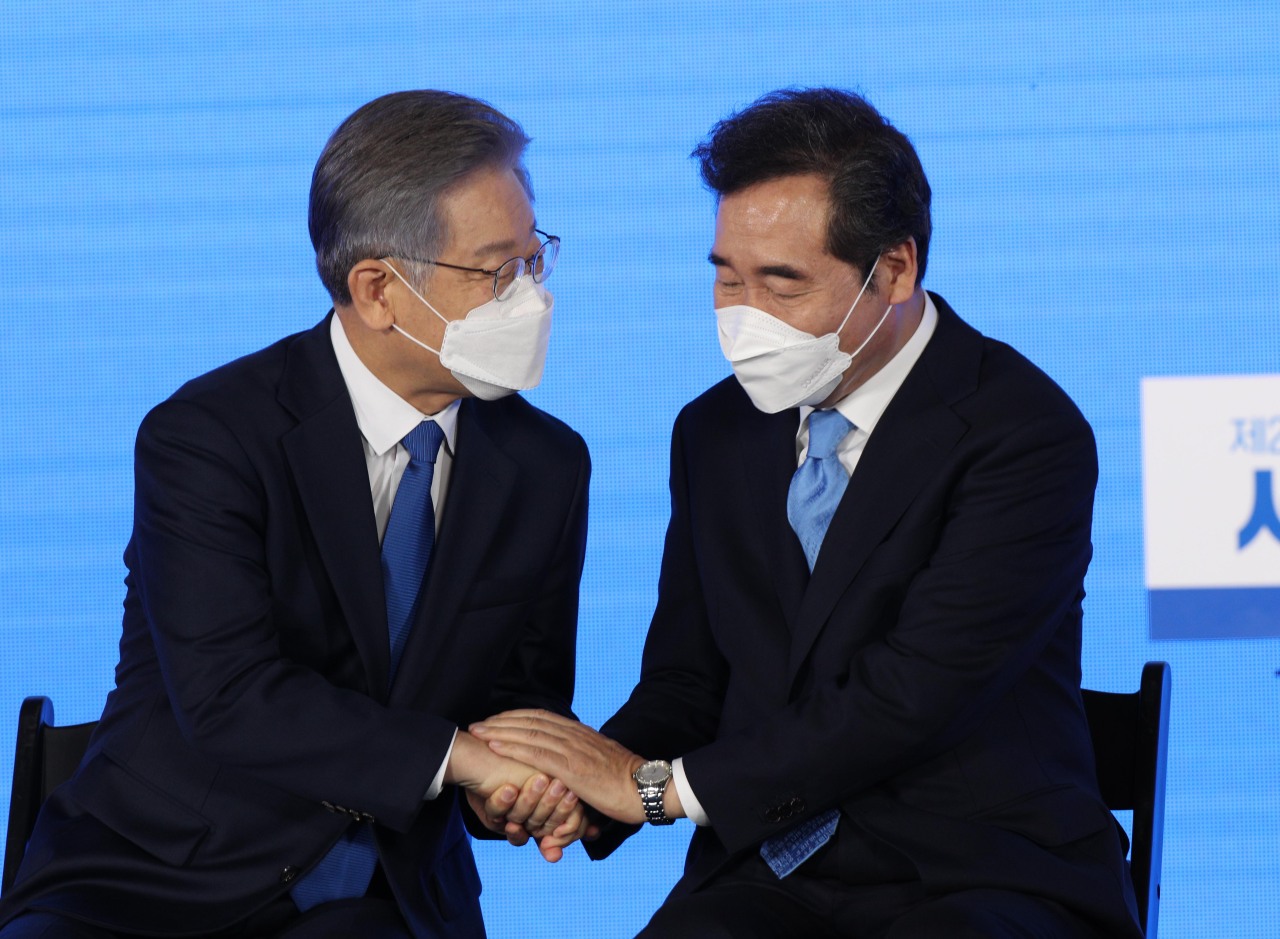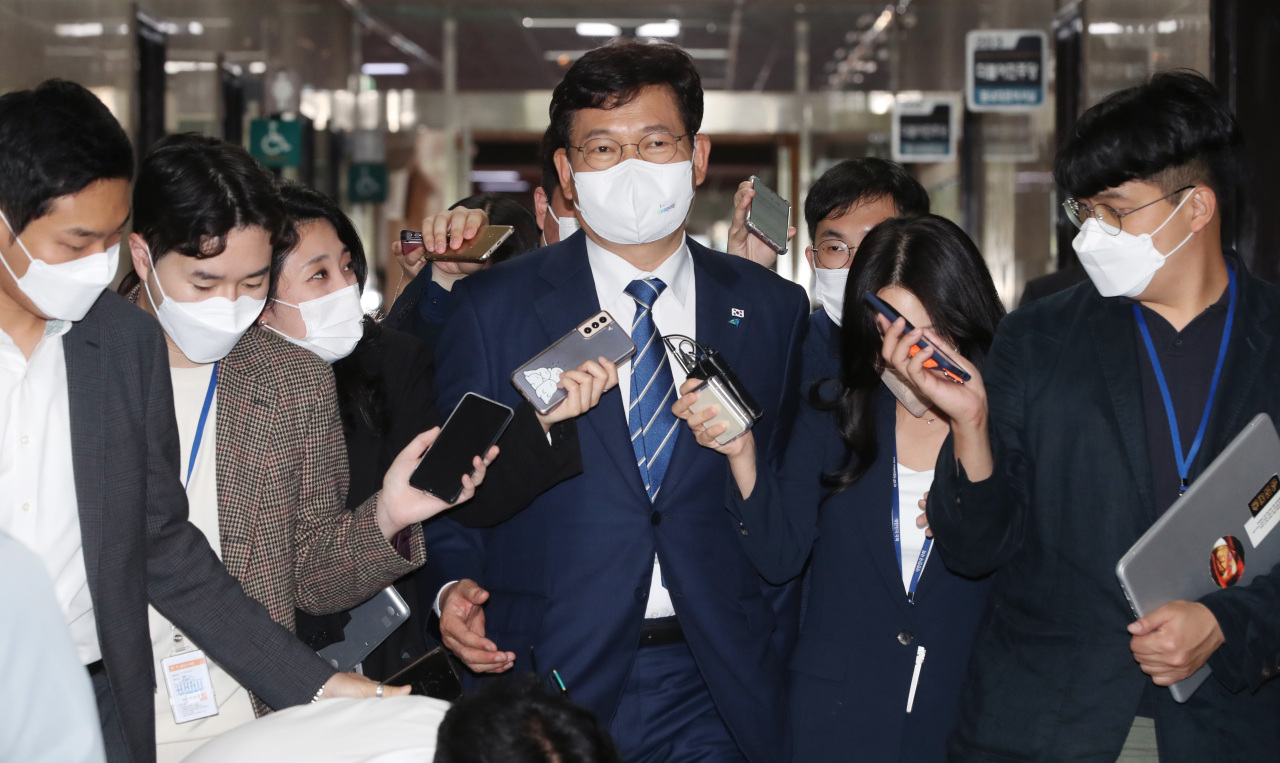Ex-PM Lee Nak-yon concedes defeat in party primary
Ruling party rejects appeal against primary results, request for runoff
By Ji Da-gyumPublished : Oct. 13, 2021 - 18:22

Former Prime Minister Lee Nak-yon on Wednesday conceded defeat in the ruling Democratic Party of Korea‘s presidential primary, shortly after the party rejected his claims of unfair vote counting.
Lee said he accepted the results of the presidential primary and sent a congratulatory message for Gyeonggi Province Gov. Lee Jae-myung’s victory.
“I respect the decision of the party affairs committee,” Lee said in a public statement posted on his Facebook.
Lee also pledged to “strive” for the party’s victory in the upcoming presidential elections and ponder on his role in overcoming difficulties that the party has been facing and gaining public trust.
The acceptance marks a turnaround for Lee’s camp who had earlier lodged an official complaint with the party’s election committee, citing the lack of justification for the results.
Earlier in the day, the Democratic Party‘s top-decision making body reaffirmed Lee Jae-myung as its presidential candidate and rejected his appeal of the primary results.
A closed-door meeting was held to discuss the appeal by former Prime Minister Lee Nak-yon and finalize a decision whether or not to hold a runoff election.
Since the Democratic Party on Sunday selected Lee Jae-myung as its candidate for next March’s presidential election, the political feud between the party leadership and runner-up Lee Nak-yon has boiled to the surface.
Lee Nak-yeon’s campaign appealed the primary results and called for a runoff vote, saying that votes given to those who dropped out of the primaries should not be discounted.
According to Lee Nak-yon’s aides, Lee Jae-myung did not gain a sufficient amount of votes to be named the party’s candidate after such votes are included.
Lee said he accepted the results of the presidential primary and sent a congratulatory message for Gyeonggi Province Gov. Lee Jae-myung’s victory.
“I respect the decision of the party affairs committee,” Lee said in a public statement posted on his Facebook.
Lee also pledged to “strive” for the party’s victory in the upcoming presidential elections and ponder on his role in overcoming difficulties that the party has been facing and gaining public trust.
The acceptance marks a turnaround for Lee’s camp who had earlier lodged an official complaint with the party’s election committee, citing the lack of justification for the results.
Earlier in the day, the Democratic Party‘s top-decision making body reaffirmed Lee Jae-myung as its presidential candidate and rejected his appeal of the primary results.
A closed-door meeting was held to discuss the appeal by former Prime Minister Lee Nak-yon and finalize a decision whether or not to hold a runoff election.
Since the Democratic Party on Sunday selected Lee Jae-myung as its candidate for next March’s presidential election, the political feud between the party leadership and runner-up Lee Nak-yon has boiled to the surface.
Lee Nak-yeon’s campaign appealed the primary results and called for a runoff vote, saying that votes given to those who dropped out of the primaries should not be discounted.
According to Lee Nak-yon’s aides, Lee Jae-myung did not gain a sufficient amount of votes to be named the party’s candidate after such votes are included.

In response, the party affairs committee confirmed the original decision made by the supreme party council and the election committee, chief spokesman Rep. Koh Yong-jin said during a news briefing following Wednesday’s meeting.
Koh said the committee saw the rejection as the ”right“ decision to take a step toward unity ahead of the presidential elections, although there were “various opinions.”
Despite the dismissal, the party affairs committee notably agreed to revise the party rule which had ignited controversy over the primary results.
The core issue centers on the interpretation of the party’s electoral rules that stipulate votes cast for dropouts to be nullified.
According to Clause 1 of Article 59 of the special party regulations for a primary, “votes cast for the candidate become invalid when a candidate resigns in the middle of the primary.”
The interpretation is crucial given that Article 60 stipulates that whoever wins a majority of the total valid votes be selected as the presidential candidate.
Chief spokesman Koh announced that the party would revise the party regulation to clear up the controversy over the interpretation of Article 59.
”I’d like to say that we will revise special party regulations ... to prevent such a problem from reoccurring in the future,“ Koh said.
During a televised news conference on Monday, Rep. Hong Young-pyo, co-chairman of Lee’s campaign, claimed that the primary election results are “clearly against the party’s constitution and rules.”
Lee’s campaign insisted that the ballots cast for Chung Se-kyun and Kim Doo-gwan, who resigned in the middle of the primary election, should not be invalidated. The camp pointed out that Lee Jae-myung’s vote share would have dropped to 49.32 percent if ballots cast for Chung and Kim before their withdrawal had been included in the final vote count.
Gyeonggi Gov. Lee Jae-myung managed to clinch the ruling party’s presidential nomination without a runoff, and he eked out a slight majority of the total votes.
Lee Jae-myung garnered 719,905 votes (50.29 percent) of the total votes during a 11-round party primary that ended Sunday, defeating his chief rival Lee Nak-yon who collected 560,392 votes (39.14 percent).
The South Korean presidential election takes place on March 9.
Koh said the committee saw the rejection as the ”right“ decision to take a step toward unity ahead of the presidential elections, although there were “various opinions.”
Despite the dismissal, the party affairs committee notably agreed to revise the party rule which had ignited controversy over the primary results.
The core issue centers on the interpretation of the party’s electoral rules that stipulate votes cast for dropouts to be nullified.
According to Clause 1 of Article 59 of the special party regulations for a primary, “votes cast for the candidate become invalid when a candidate resigns in the middle of the primary.”
The interpretation is crucial given that Article 60 stipulates that whoever wins a majority of the total valid votes be selected as the presidential candidate.
Chief spokesman Koh announced that the party would revise the party regulation to clear up the controversy over the interpretation of Article 59.
”I’d like to say that we will revise special party regulations ... to prevent such a problem from reoccurring in the future,“ Koh said.
During a televised news conference on Monday, Rep. Hong Young-pyo, co-chairman of Lee’s campaign, claimed that the primary election results are “clearly against the party’s constitution and rules.”
Lee’s campaign insisted that the ballots cast for Chung Se-kyun and Kim Doo-gwan, who resigned in the middle of the primary election, should not be invalidated. The camp pointed out that Lee Jae-myung’s vote share would have dropped to 49.32 percent if ballots cast for Chung and Kim before their withdrawal had been included in the final vote count.
Gyeonggi Gov. Lee Jae-myung managed to clinch the ruling party’s presidential nomination without a runoff, and he eked out a slight majority of the total votes.
Lee Jae-myung garnered 719,905 votes (50.29 percent) of the total votes during a 11-round party primary that ended Sunday, defeating his chief rival Lee Nak-yon who collected 560,392 votes (39.14 percent).
The South Korean presidential election takes place on March 9.









![[Kim Seong-kon] Democracy and the future of South Korea](http://res.heraldm.com/phpwas/restmb_idxmake.php?idx=644&simg=/content/image/2024/04/16/20240416050802_0.jpg&u=)








![[KH Explains] Hyundai's full hybrid edge to pay off amid slow transition to pure EVs](http://res.heraldm.com/phpwas/restmb_idxmake.php?idx=652&simg=/content/image/2024/04/18/20240418050645_0.jpg&u=20240418181020)

![[Today’s K-pop] Zico drops snippet of collaboration with Jennie](http://res.heraldm.com/phpwas/restmb_idxmake.php?idx=642&simg=/content/image/2024/04/18/20240418050702_0.jpg&u=)